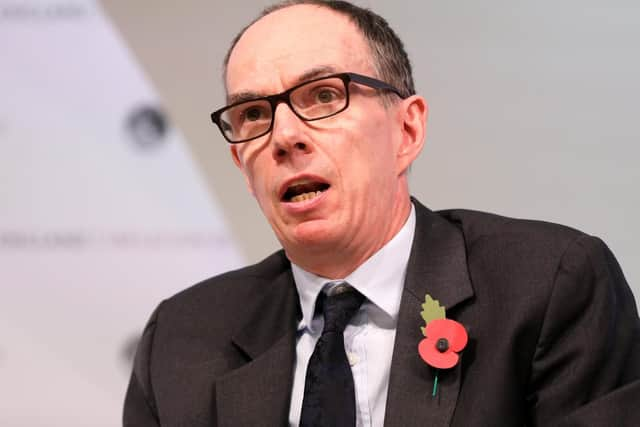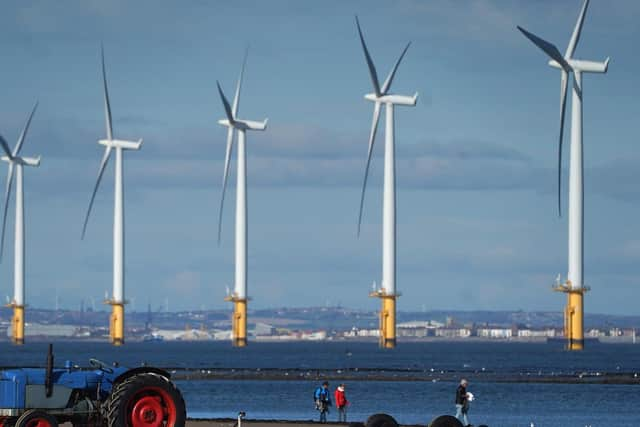Yorkshire's economy well-placed to lead country's economic recovery - Bank of England boss
Dave Ramsden, deputy governor for markets and banking, said that opportunities for the Government’s green economy agenda are present in Yorkshire and that the region’s diversified economy should make the region more resilient to the economic downturn brought about by the pandemic.
Speaking exclusively to The Yorkshire Post following a virtual visit to the region in which he met with both business leaders and members of the public, the former senior Treasury advisor said that while current projections pointed to a gradual economic recovery, there was a danger of it being felt at varying levels across the country.
Advertisement
Hide AdAdvertisement
Hide AdAnd he added that, while negative interest rates were not under current consideration by the Bank of England it was something that it was keeping at its disposal should conditions fluctuate.


“We know for example that there is quite a strong basis for renewable industries in Yorkshire,” he said.
“You have got those longer term, critical transitions and transformations that we have got to make and that local people seem very focused on. It feels like for some of those longer term challenges that Yorkshire and Humber, with quite a diversified economy, is quite well set up for.
"But that does not mean for doesn’t mean that for particular cities, or towns or sectors that things are not very tough. But those opportunities for what the Government calls building better and greener, those are there.”
Advertisement
Hide AdAdvertisement
Hide AdThe Bank of England has predicted a downturn of four per cent in GDP as a result of the current lockdown, followed by a gradual recovery, with finances not due to recover to pre-Covid levels until the first quarter of 2022. Mr Ramsden said that for consumer-facing businesses, like hospitality, the fall will be much bigger but said the region’s economy as a whole was resilient.


He said: "My sense is that the economy is quite diversified but that is not to downplay the current difficulties.
"I am very conscious that for consumer-facing businesses, like hospitality, the fall will be much bigger.
"But then you have got a strong finance sector, strong fintech, chemicals on the Humber, you have got power generation.
Advertisement
Hide AdAdvertisement
Hide Ad“You have got most sectors of the economy well represented.


“So in that sense that diversification should mean that across the region as a whole that there will be resilience. A lot of companies have shed staff but they will be able to be part of the recovery.”
Many households having accumulated savings due to the economy being shutdown for much of the past 12 months, leading some commentators to predict a boom in spending when restrictions are eased.
However Mr Ramsden counselled that an increase on consumer spending would vary across different demographics and regions.
Advertisement
Hide AdAdvertisement
Hide Ad“Some people have been able to accumulate a lot of savings but those people are typically more in high income brackets,” he said.
“People at the bottom end of the income distribution, people who may have less job security and lower incomes, they haven’t been able to build up savings. So it is a balance between how much will those higher income consumers be putting back into the economy against some people who won’t have any accumulated savings, who live from day-to-day.”
The Bank raised eyebrows in February when it announced it had placed negative interest rates into its range of options to protect the UK economy.
Interest rates are already at historic lows. Mr Ramsden said that its current policy was to utilise quantitative easing, the process of injecting money into the economy, and that it currently did not think negative rates were needed.
Advertisement
Hide AdAdvertisement
Hide AdBut he said it was important to have the measure as a “tool” if forecasts for the recovery did not materialise.
He said: “We want to be in a position that if things didn’t get better as we are forecasting, if some of downside risks around new variants arose, that that tool of negative rates can be feasibly used if at the time we made the policy decision to use it.
“So we have asked banks on a contingency basis to do the preparations over the next six months so that tool is ready. But that is very different from thinking it will be used."